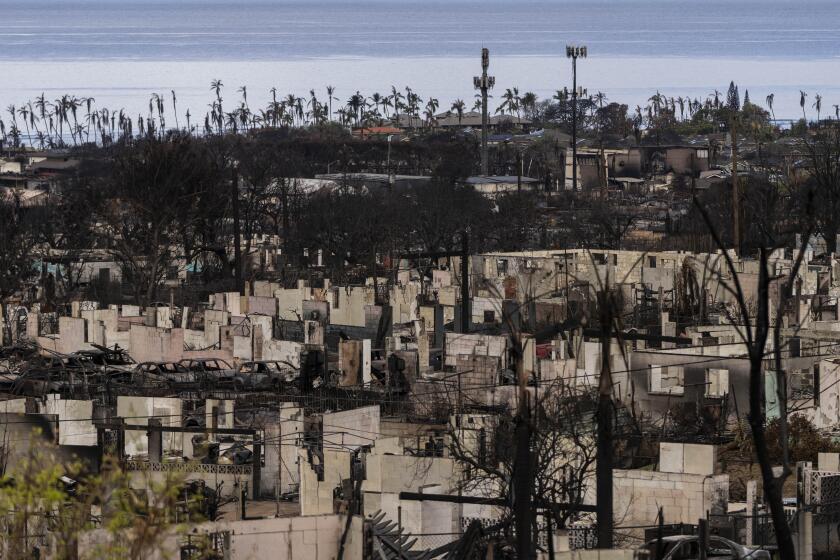Mohammed Zaher Shah, 92; Afghanistan’s last king was called ‘Father of the Nation’
Afghanistan’s last king, Mohammed Zaher Shah, died Monday, plunging his battered country into mourning and inspiring a wave of wistful nostalgia for better days. He was 92.
Zaher Shah, an ineffectual yet beloved monarch, spent nearly three decades in genteel exile after being ousted in a palace coup in 1973.
He returned to Afghanistan in 2002 after the fall of the Taliban, and although he played no significant political role, he served for many as an emblem of the country’s yet-unrealized hopes for rebuilding.
The former king’s death was announced by Afghanistan’s president, Hamid Karzai, a distant relative. He called the ex-monarch “the servant of his people, the friend of his people.” Both Zaher Shah and Karzai hailed from the Pashtun ethnic group, which also gave rise to the Taliban. After the fundamentalist militia was driven from power by U.S.-led forces following the Sept. 11 attacks, many Afghans hoped that Zaher Shah -- Shah means “king” -- would once again lead the country, as monarch or president.
But Zaher Shah, by then already frail and in his 80s, declined.
Nonetheless, he gave his blessing to Afghanistan’s new constitution in 2004, which gave him the ceremonial title of “Father of the Nation.” Karzai declared three days of mourning for the former king, whose body was to lie in state at a Kabul mosque. Television and radio stations in Afghanistan played somber music and Koranic verses after the death was announced, devoting nearly all their airtime to retrospectives of the king’s life.
Zaher Shah’s reign, the last in a 300-year dynasty, began with a wrenching drama. In 1933, at age 19, he witnessed the assassination of his father, Muhammed Nadir Shah. Hours later, Zaher Shah ascended the throne.
Even while king, Zaher Shah was largely under the thumb of relatives who held the real power.
But during the years of his reign, Afghanistan, though still considered a backwater, enjoyed a brief window of peace, tranquillity and an acquaintance with what until then had been a distant outside world.
The king made fitful efforts at modernization, and, by the 1960s, the capital, Kabul, had achieved some of the trappings of a world city, with eclectic arts festivals, a growing middle class, miniskirted women and international-class hotels.
In 1964, Zaher Shah declared Afghanistan a constitutional monarchy. That included still-cherished reforms, including universal education and women’s rights.
A cousin, Mohammed Daoud Khan, overthrew him in 1973 -- when Zaher Shah, characteristically, was on a leisurely visit to Europe, taking the waters in southern Italy.
But in the last quarter of the 20th century, Afghanistan’s strategic location became its undoing. Zaher Shah was absent during the traumas that racked his country from the mid-1970s onward: the Soviet invasion, the brutal civil war fought by Afghan warlords in the 1980s, and the rise of the austere, pious Taliban movement.
In Kabul, Abdul Qadir, 73, a retired civil servant, remembered Zaher Shah’s reign as a golden era.
“The people were happy, and we had a good life -- we can’t compare this with the hardships we’re experiencing now,” he said.
Zaher Shah’s years in exile were largely quiet ones, save for a 1991 assassination attempt by a zealous Angolan-born convert to Islam. The exiled king suffered stab wounds but recovered.
Despite ongoing tensions between Afghanistan and Pakistan, condolences arrived from Pakistan’s military leader, President Pervez Musharraf. The United Nations special representative in Afghanistan, Tom Koenigs, hailed Zaher Shah’s “unifying influence.” Ahmed Rashid, a prominent Pakistani journalist who knew the former monarch well, described him as a figure both stymied and bemused by the historical changes that swept his homeland.
“He was a wonderful old man, never very ambitious, though he cared deeply about his country,” Rashid said. “He missed several opportunities to change the course of events.... But in a setting where ruthlessness is the norm and modesty is not, he was a bit of an oddity.”
Zaher Shah’s wife, Queen Homaira, died in 2002 in Rome, an event that was said to have sapped the former king of strength and his will to live. She was buried in a royal cemetery on the outskirts of Kabul, where he is to be buried today.
--
Special correspondent Faiez reported from Kabul, and Times staff writer King from Istanbul, Turkey.
More to Read
Start your day right
Sign up for Essential California for news, features and recommendations from the L.A. Times and beyond in your inbox six days a week.
You may occasionally receive promotional content from the Los Angeles Times.






